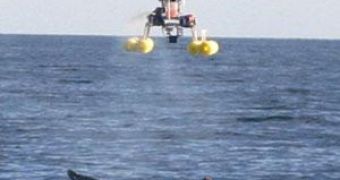While children crave for a toy helicopter under the Christmas tree, scientists use them to collect data on how whales are affected by their environment, and other risk factors. By equipping remote-controlled toys with Petri dishes, and flying them through snots, Zoological Society of London veterinarian and conservation biologist Karina Acevedo-Whitehouse aims at identifying the viruses and bacteria that live in the animals' lungs, and what risks the microorganisms pose.
"Most studies on whale pathogens have focused on dead, stranded or captive animals, which are hardly representative of the normal population," she said. Taking blood samples from whales living in the oceans is very difficult, due to the size of the animals, so researchers needed a new way of figuring out what diseases they faced. Over the past few years, Acevedo-Whitehouse has been doing just that, with her RC helicopters.
"The whales definitely notice the helicopter. They turn on their sides to look at it. But they don't seem bothered. We are collecting very relevant biological information without harming them in the least – we don't even touch them," the researcher said. Before this technique, she used poles, outfitted with Petri dishes, to reach whales' snots. But that technique only worked on a few species, as others are bothered by the presence of a boat nearby.
After the samples are harvested, they are taken back to the lab and subjected to extensive testing that scans for all types of viruses, including those similar to the flu and tuberculosis (TB). DNA sequencing offers an invaluable tool in this task, as the genomes of various fungi and bacteria can be easily identified through this technique.
To prove the effects of the new data collecting method, Acevedo-Whitehouse said that her team had already pinpointed specific differences in bacterial flora between stranded whales and free ones, as well as between those living in captivity and the ones roaming the oceans. These discoveries will hopefully provide more insight into how various environmental conditions affect the health of the whales.

 14 DAY TRIAL //
14 DAY TRIAL //